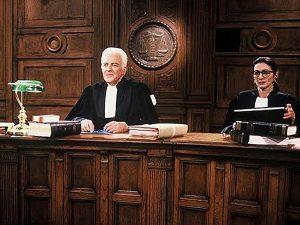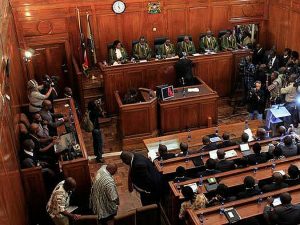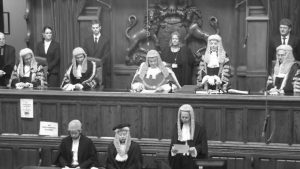How To Give Evidence In Court: In deciding a case, the courts are guided ultimately by the evidence presented before it. The court does not go on a fluoric of hunting for evidence even when it knows that such evidence or facts exist. This same practice is applicable in various country jurisdictions. The matter of evidence is a procedural matter. In essence, certain procedures must be followed; otherwise the evidence will not be of value before the court.
Evidence may be oral or documentary. Whichever form the evidence takes, it must be presented in compliance with the procedure prescribed by law. The principles guiding oral evidence differ from those of documentary evidence. However, the principles are structured in a manner that both oral and documentary evidence play complementary role toward each other.
In this article, the manner by which evidence is given in court shall be discussed. First, they shall be discussed generally, and then be narrowed down to that of the Nigerian jurisdiction where specific analysis is needed.
Recommended: Best Fashion Schools In Canada
How To Give Evidence In Court
1. Determine the nature of the evidence: The first thing is to determine the nature of the evidence sought to be tendered, as to whether it is oral or documentary. Generally, oral evidence is admissible in court in specific circumstances. One is during examination of witnesses. There is examination in chief, cross-examination and re-examination.

In various jurisdictions, and also depending on the court, the witnesses are required to frontload their witness statement on oath or affidavit as the case may be. The copies of the statement are to be given to the court through the appropriate authority; and to the opposing parties who are entitled to discredit the statement by reply and cross-examination. Some courts do accept that evidence in chief be given orally in an open court, for example, magistrate, customary court, and other native courts in Nigeria. Again, cross-examination is also an avenue to extract further oral evidence from a party who has given a testimony in a case. This procedure is guided by the Evidence Act.
On the other hand, where the evidence sought to be tendered is documentary, it shall first be determined whether the document is a private or public document; and whether it is a primary or secondary document. The nature of any document in this purview has its implications. Where the document is a public document, the certified true copy its original can be tendered. It can also be tendered in the absence of the maker. Where, however, the document is a private document, the right thing to do is to tender it through the maker of the document.

This is what is obtainable in Nigeria, and it is similar to what is obtainable in other various jurisdictions. Where the document is not tendered through the maker, if it is admitted in evidence, the content of it shall not be relied on. More so, the original copy of the document can be tendered without the need to certify it.
Photocopies of documents can be as well be tendered in court in certain circumstances, for instance, where the original copy of the document is lost and cannot be found. Having determined the nature of the document sought to be tendered in evidence, the party shall then proceed to arranging them in accordance with the procedure.
Recommended: Most Technology Advanced Countries In The World
2. Filing of the document: Every document sought to be tendered in court for evidence must be filed through the appropriate officer of the court, usually the court registrar. This usually attracts some fees. After the fees have been assessed and payment made, the appropriate officer takes record of the documents and transmit them accordingly.

3. Service on the other party: In fulfillment of the rules of fair hearing, a party shall not be ambushed. A party shall be given adequate notice to know the extent of the claims against him and thereon prepare a defence. In this regard, it is required that a copy of any document or written statement on oath or affidavit as the case may be, sought to be tendered in court shall be served on the opposing parties.
Where this is not done, it can defeat the entire proceeding. The issue of fair hearing is a fundamental one. In essence, it goes to the root of the matter.
Recommended: Most Dangerous People In the World
4. Marking of exhibits: The documents sought to be tendered are to be marked exhibits and numbered accordingly. When it is tendered and admitted, the court ascribes it an exhibit tag accordingly, for instance, exhibit “A”.

5. Laying of foundation: It is important that while tendering a document before the court, proper foundation should be laid. What is meant by proper foundation is that the party shall explain to the court how the document sought to be tendered came about, and its relevance in the case before the court. In other words, it is the act of establishing a link between the document being tendered and the ongoing case.

Most often, and in various jurisdictions, the counsel asks the witness questions which direct him or her to laying foundation. Where the law or practice requires laying of proper foundation and any party neglects to do so, it may render the document inadmissible.
Recommended: Roadmap to become a ui ux designer
6. Objections: The need to consult a legal practitioner cannot be overemphasized. A document being tendered in evidence can be relevant to the facts in issue and still be rejected by the court. This happens where the procedural requirements are not complied with. Before any document is admitted to serve as evidence in court, the court will always afford the opposing party an opportunity to raise objection with respect to the admissibility of that document.

This is in accordance with the principle of natural justice, specifically, fair hearing. Where the opposing party raises any issue affecting the admissibility of a document, the court will also afford the party tendering the document an opportunity to reply. Where the objection is sustained, the document shall be struck out and marked rejected. Where the objection is overruled, the court shall admit the document and mark it as exhibit accordingly.
Recommended: Highest Paying Programming Jobs
7. Cross-examination: Where a document is admitted in evidence, the opposing party can cross-examine the party who tendered the document. He can be asked questions pertaining to the document, and if his credibility is discredited, the court shall take notice of that and be mindful of the degree of reliance to be placed on the document.

A witness can also be cross-examined based on his witness statement on oath or sworn affidavit. Where the witness contradicts his written statement on oath, the court shall also take notice of that and apply the law cautiously.
8. Observe proper etiquette in court: The court is a temple of justice and must be treated with utmost reverence. It is important therefore to know the court etiquettes and observe them accordingly. It is expected that you consult a lawyer in your case.

The lawyer is expected to guide his clients on the proper court etiquettes. Non-compliance with the etiquettes does attract punishment which could be in form of fine, imprisonment, seizure of property or community service.
Recommended: Richest Companies In Nigeria
Conclusion
Giving evidence in court is not as straightforward as evidence sounds. Regardless of the authenticity of any evidence, it would be liable to be struck out if it is not properly given. It is therefore important to study the Evidence Act as well as the relevant court rules which are the laws that basically regulate evidence in court.

Edeh Samuel Chukwuemeka, ACMC, is a lawyer and a certified mediator/conciliator in Nigeria. He is also a developer with knowledge in various programming languages. Samuel is determined to leverage his skills in technology, SEO, and legal practice to revolutionize the legal profession worldwide by creating web and mobile applications that simplify legal research. Sam is also passionate about educating and providing valuable information to people.